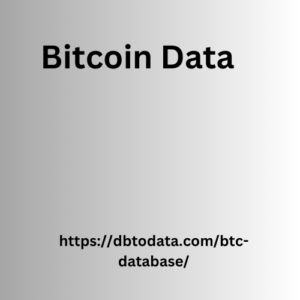Discover how the Verifactu system, which the “Anti-Fraud Law” requires to be implemented, will transform billing in your company: features, requirements, advantages, entry into force and sanctions. Get ready for the change!
Features of the Verifactu system
What is Verifactu?
Verifactu ( Veri*Factu ) is a Verifiable Invoicing System, designed to facilitate the sending of billing records directly to the State Tax Administration Agency (AEAT). This system is part of the efforts promoted by the to modernize and secure the billing process, promoting transparency and efficiency in business operations.
Verifactu not only simplifies invoice management , but also incorporates blockchain technology to validate them, ensuring their authe Bitcoin Data nticity and contributing to the fight against tax fraud. However, it is important to note that its application is optional and does not extend to regional territories or to companies under the Immediate Information System (SII).
- Facilitates the sending of billing records to the AEAT.
- Promotes transparency and efficiency in business operations.
- Uses blockchain technology to validate invoices.
- It is optional and not applicable in regional territories or to companies with SII.
Main features
The Verifactu system offers a wide range of functionalities designed to optimize business management. Among the most notable are order management, warehouse control and integration with various eCommerce platforms. These tools are essential to improve the operational efficiency of any company .
Below is a list of some of its main features:
- Orders management
- Tasks and work parts
- Warehouse management
- Code reader
- Picking
- Scorecard
- Signing of documents
- Times per project
- MES and Plant Control
- Customer Portal
- Integration with eCommerce platforms
Each of these features is designed to facilitate daily operations and contribute to the sustained growth of companies. The integration of Verifactu with systems and eCommerce platforms, for example, allows for more agile and efficient management of resources, which translates into a significant competitive advantage.
Benefits for companies
Implementing Verifactu in your company brings with it a series of benefits that not only optimize invoice management, but also improve customer experience and business decision-making. Data security and tax compliance are significantly strengthened , providing peace of mind for both the company and its customers.
Among the most notable benefits, we find:
- Improved customer retention and boosted revenue growth.
- Optimizing efficiency and focusing on sales.
- Facilitation in compliance with new regulations and laws, such as the Create and Grow Law.
In addition, Verifactu enables small and medium-sized businesses to analyze the status of their business with greater knowledge and confidence, which translates into better decisions and sustainable growth.
When does Verifactu come into effect?
Key date: July 1, 2025
Adaptation period for companies
Once the key dates have been established, it is crucial to understand the adaptation period that our companies will face in order to comply with Verifactu. We must all be prepared to adapt our information systems before July 1, 2025. This deadline applies to both users/customers of the software and developers, who must ensure that their programs comply with the new regulations.
To facilitate understanding, here is a summary of the adaptation periods:
- Software users/customers : Must be fully adapted to the regulation as of July 1, 2025.
- Software developers (ERP, management, billing, etc.) : They have a period of nine months from the publication of the ministerial order in the BOE to adapt their programs to the new regulations.
It is important to note that these deadlines may vary depending on the company’s annual turnover. Companies with an annual turnover exceeding 8 million euros will have a period of 1 year after the publication of the Create and Grow Law to adapt, while the rest of the companies will have a period of 2 years. This is a fundamental aspect to take into account in order to properly plan the transition to Verifactu.
Penalties and fines for failing to implement Verifactu?
Up to €150,000!
When the Anti-Fraud Law is in force (remember: 01/07/2025), the mere possession of a system, program or application that is not certified (i.e. that does not use Verifactu as standard) will be considered a serious infringement . This infringement can lead to fines of up to 150,000 euros.
Who is affected by Verifactu?
Companies and self-employed
In the Verifactu universe, both companies and freelancers play a crucial role. We are all in the same boat , sailing towards digitalization and efficiency in invoice management. Adapting to Verifactu is an important step to comply with the new regulations and take advantage of the benefits offered by the system.
Here is a list of those who should pay special attention to Verifactu:
- Self-employed
- SMEs
- Professional Offices
- Consulting and Management
- Big enterprises
It is important to note that certain sectors and types of companies may have specific requirements or be subject to exceptions. For example, companies that are already in the SII or those exempted from issuing invoices under certain regimes are not required to adopt Verifactu. However, for most, Verifactu represents an opportunity to improve invoice management and efficiently comply with tax obligations.
Most impacted sectors
In our experience, we have observed that Verifactu has a significant impact on several sectors, especially those that handle a high volume of transactions and sensitive data. The most impacted sectors include healthcare, retail, logistics, automotive and insurance . These sectors benefit greatly from the implementation of Verifactu due to improved invoice management and data security.
Below is a list of the sectors most affected by the implementation of Verifactu:
- Health
- Retail
- Logistics
- Automotive
- Insurance
Each of these sectors faces unique challenges in managing their invoices and data. Verifactu offers specific solutions that help overcome these challenges, thus facilitating tax compliance and improving operational efficiency.
How are invoices identified with Verifactu?
Identification process
To ensure the correct identification of invoices under the Verifactu system, it is essential to follow a specific procedure. Each invoice issued must include certain data that unequivocally link it to the issuer and the recipient , thus ensuring its authenticity and the integrity of the information it contains.
The basic steps in the identification process include:
- Verification of the identity of the issuer and the recipient of the invoice.
- Inclusion of a unique invoice identification code.
- Record of the issue date and transaction details.
This process not only makes it easier to track and manage invoices, but also contributes to data security and transparency in business operations. By adopting Verifactu, businesses ensure they comply with legal requirements and improve their billing practices.
Technical requirements for invoices
To ensure the authenticity, integrity and legibility of invoices, it is essential to comply with certain technical requirements. All electronic invoices must be identified with a unique code , which facilitates their traceability and control. In addition, they must be issued through an approved platform, either the Public System of the Tax Agency or a private solution that complies with established regulations.
IT billing systems, such as computers and POS terminals, must be adapted to include an identification code (TBAI) and a QR code on each invoice. These codes collect all relevant information and ensure that each invoice has a unique identity. In addition, it is crucial that any platform that issues invoices has a Device Certificate, providing a unique identity to each device from which the invoice is issued.
- The authenticity of its origin.
- The integrity of its content.
- Its legibility, from its date of issue during its conservation period.
These elements are essential for compliance with current regulations and to ensure efficient management of invoices in the digital environment.
If your ERP is adapted to the new regulations, it will already comply with the Verifactu system.
Advantages of the Verifactu system
Improved invoice management
With Verifactu, we have seen a marked improvement in our invoice management. Automating VAT calculations and automatically generating accounting entries from sales invoices and bank flows has been a game-changer. Not only does this save time on reconciliations by automatically linking payments to outstanding invoices, but it also frees up our team to focus on more strategic tasks.
Here are some key points on how Verifactu improves invoice management:
- Automatic generation of accounting entries.
- Automatic linking of payments to outstanding invoices.
- Automation of VAT calculations.
- Custody and storage of electronic invoices.
These features allow us to spend less time on routine tasks and more on planning and decision-making, thereby improving our control processes and operational efficiency.
Increased data security
In our quest to offer comprehensive solutions, we understand that data security is paramount. Verifactu significantly increases data security by implementing advanced measures such as two-factor authentication and data encryption. These measures not only protect against unauthorized access, but also ensure that sensitive information remains confidential.
In addition, Verifactu establishes different access levels for employees and suppliers, ensuring that each one accesses only the information necessary for their role. This translates into more secure and efficient data management. Below are some of the key security measures:
- Two-factor authentication
- Data encryption
- Traceability of any download, dump or storage of records
- Unalterable preservation of the original data
- Automatic recording of interactions and operations
These measures not only reinforce security, but also promote a culture of data protection within the company, thus minimizing the risks of security breaches.
Facilitating tax compliance
With the implementation of Verifactu, compliance with tax obligations becomes simpler and more direct for companies and self-employed workers. This simplification translates into a significant reduction in the time and effort required to stay up to date with the Treasury. In addition, the system allows for greater transparency and precision in the presentation of invoices, which minimizes the risk of errors and, therefore, of possible sanctions.
Below are some of the key benefits of Verifactu in relation to tax compliance:
- Improved accuracy of tax returns.
- Reduction of billing errors.
- Easy to keep up to date with the latest regulations.
- Minimizing the risk of penalties for errors or non-compliance.
Verifactu not only facilitates the tax compli Brazil Phone Number List ance process, but also contributes to greater efficiency in the internal management of companies. In the end, this translates into more time and resources that can be dedicated to the growth and development of the business.

